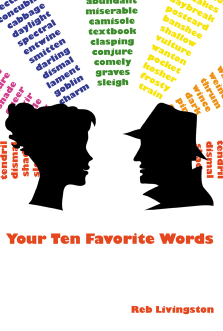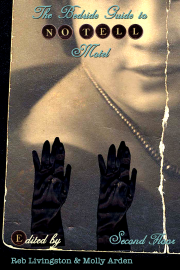On Being a Gal of Working Class Background
I feel Dan's pain. A few years ago up at Bennington I was chatting with the usual bunch of complainers about how the school wasn't doing enough to include people of various backgrounds (which I don't exactly agree with, I think some people ignore extenuating circumstances out of the college's control and the things that are being done, but I digress). One gal brought up the "and there's no working class people here" which I knew not be accurate and I mentioned a few examples of current students with blue collar jobs and backgrounds.
David Mcdonald chimed in with "Reb is working class." I corrected him by explaining by some people's definition, I was raised working class. My adult life is far from working class, but if being working class once is all it takes, then yep, I'm marked. I spent most of my childhood living in a steel town with my extended family including my grandfather who was a builder. My mother just turned 15 when I was born (only finished 9th grade), my father went to technical school to learn how to fix TVs and appliances (which turned out to be a better deal because he learned electronics and was able to get a job fixing computers for Digital and later get a staff job at CMU). The "rich" kids in my school were the ones with parent's who worked for the borough (yeah, that's right, the people who maintained the roads) or owned businesses (like auto repair or pizza shops). Aside from a summer camp my sister and I attended in 1984 (we got the poor kid scholarship), I never met people with any serious money until college (which I didn't have to pay for because my dad was staff there -- talk about a sweet break, I never would have been able to attend otherwise). Speaking of college, I never even heard the term "working class" until I was a freshman and read Marx. I was even more shocked when I came to the realization that my new "peers" considered my family and me that way.
But back to the considerate gal standing up for all us poor slobs with our hard hats and lunch pails. At first she was perplexed (she had no idea, maybe she felt betrayed because we were "passing"). Then she said none of us counted (like one time another gal said Carl Phillips wasn't really a black poet). So I guess since I have long lost my childhood mullet, have pretty finger nails and don't write poems about my kin losing their toes and eyes in the steel mills, I don't count. That's fine, I don't go around introducing myself as a poet with a "working class" background anyhow. I feel no need to establish my Jell-O slurping Kool Aid mustache cred.
But if I get one more invite to another "funny" white trash costume party, I am going to freak.






9 Comments:
I think Pappap was a builder, not a carpenter. He worked a lot with porcelain and brick.
Unless of course by grandfather you meant Jesus.
TB
This comment has been removed by a blog administrator.
I heard him refer to himself as a carpenter, but yes, he worked with bricks and porcelein too.
I spit my Tang all over my keyboard @ Carl Phillips not being black.
And just as an aside, regardless of how white his mother is and how many houses he owns, Carl Phillips is HOT with Two T's.
I sometimes forget what a strange place I live in. In my neck of the woods, the only poets with any sort of acclaim, validity, etc. are "working class poets." Mind you, this has little to do with one's background, or current occupation, but rather, how many poems one writes about factories, tree-falling, etc. If, like me, you come from a small town with working-class parents, but don't happen to write about it, you are not treated kindly by the "real poets." Folks like me are seen as somehow aberrant, enemies of poetry, enemies of the "common folk." Of course the "working class poets" hold comfy academic chairs and have soft hands.
Yeah, cause the working class have no interest in love or desire or any other universal subject.
As you can tell by the above exchange with my sister, our grandfather didn't come home every evening and talk on and on about his job. He had other interests, like history (WW I and II, Germany, the Depression), classical music, science, his inventions, religion and astrology and reincarnation. An interesting and sometimes conflicting mix of subjects. Not that he read poetry, but if he did he would have read poems on the above subjects, not poems dealing with house building or steel mills or unions or whatever.
I guess I should clarify. "Working Class," in my country, as an adjective applied to poetry, is synonymous with "plain narrative." What the soft-handed academics (who once spent a summer working in a Kleenex factory) who write "working class" poetry assume is that the "common people" are also "simple" people and that they have no interest in poetry that isn't as straightforward and monosyllabic as a third-grade textbook. I'm exaggerating, but only very slightly. They write about "love" and other universals, but formally, they're suspicious of anything more radical than Phil Levine or Sharon Olds. And they are big on identity politics. I ran into some big trouble a few years back because my poems didn't have lumber mills and/or refried beans in them. Hey, that's the title for my next book: "Working Class Spic."
Ooh ooh ooh, T, how about, "Refried Beans and Quesadilla Dreams: Working Class Spic"?
That'd look dandy next to my, "Dodging the Mullet."
Once somebody at U of Pitt suggested I write a manuscript called "White Trash." Frankly I prefer "Dodging the Mullet" or maybe "Mama, Baby and a Pack of Marlboros Make Three."
Post a Comment
<< Home